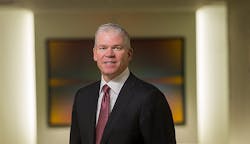Texas Instruments' Templeton to Step Down; Crutcher Promoted
Texas Instruments Inc. said Rich Templeton is stepping down as president and chief executive officer after more than 13 years at the helm of the company, the world’s largest maker of analog semiconductors. He’ll be replaced by Chief Operating Officer Brian Crutcher.
Templeton, 59, will remain chairman of the Dallas-based chipmaker after handing over his position June 1. Both men have spent more than 20 years at Texas Instruments, one of the companies that spawned the semiconductor industry. Crutcher previously oversaw the company’s main analog businesses.
"Brian is an exceptional leader who inspires others and delivers great results," Templeton said Thursday in a statement. "His disciplined focus on our business, manufacturing and sales channels has heightened the value we offer customers and the return we provide shareholders."
Templeton led the transformation of 87-year-old Texas Instruments from a maker of digital chips into a provider focused on analog semiconductors -- simpler, more fundamental components that have become increasingly vital as everyday items have acquired electronic functionality. That helped the company become far more profitable, and freed it from competition with Intel Corp. and Qualcomm Inc. On his watch, Texas Instruments’ stock gained more than fourfold.
Once better known for scientific calculators and for dominating chips that connected cell phones to networks in the early days of that market, Texas Instruments now has the most diverse product catalog and customer list in the semiconductor business. Templeton steered the company in that direction, arguing that diversity would lead to less exposure to the boom-and-bust cycles of digital chips, reduce the need to spend on research and design, and help Texas Instruments take advantage of the growing need for analog parts.
Such chips perform the fundamental task of translating real-world inputs, like sounds and touch, into electronic signals. Texas Instruments chips can be found in everything from smartphones such as Apple Inc.’s iPhone to industrial equipment to space hardware. A typical role for its products might include converting power from one voltage to another inside a battery-powered device.
This type of chip can sell for less than a dollar; Texas Instruments has made them more profitable. The company’s gross margin, or the percentage of sales remaining after deducting the cost of production, has expanded to a projected 64% for 2017. In 2009, that measure -- a key indicator of the financial health of chip companies -- was about 48%.
Texas Instruments critics have said that improvement has come at the cost of overall growth. Spinoffs and division closures caused revenue to shrink for three consecutive years from 2011 and 2013. In 2017, the company reported three double-digit percentage increases in quarterly revenue, a growth spurt that analysts are projecting will cool down.
With a market value of about $115 billion, the company has increasingly shunned the limelight under its outgoing CEO. It no longer holds flashy product release events, it’s scaled back advertising, and it gives out less information about end markets and individual products. Texas Instruments has shifted communication to focus on its cash-return programs, dividends and share-buyback plans that have helped its stock rise an average of 28% a year over the past five years.
By Ian King
About the Author
Bloomberg
Licensed content from Bloomberg, copyright 2016.
